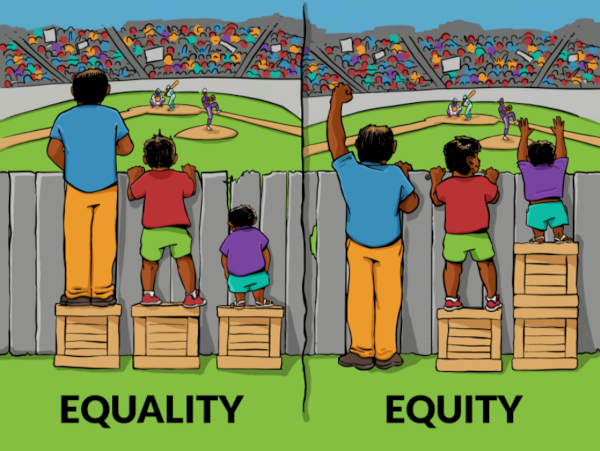By Misty Haji-Sheikh, JEDI Chair
Justice, Equity, Diversity, and Inclusion - JEDI. What does this mean and why is it important? Each month we will look at different aspects of JEDI and how JEDI within our Chapter makes us better.
April 14 - Equity
What is the difference between Equity and Equality? Equality is everyone getting the exact same treatment. Sounds fair, but is it? Equity is making sure each person gets what they need. This is an example:

Equality is given each person the exact same thing. Equity is making sure that each person gets what they need. Equity leads to Equality.
One thing we all can do is learn more about Equity Language.
Sierra Club's Equity Language Guide is a great place to start.
March 10 - Justice.
Justice is defined as: “Justice, in its broadest sense, is the principle that people receive that which they deserve, with the interpretation of what then constitutes "deserving" being impacted upon by numerous fields, with many different viewpoints and perspectives, including the concepts of moral correctness based on ethics, rationality, law, religion, equity, and fairness.” (source here)
I also like this:
“a concern for fairness, peace, and genuine respect for people”
At the Sierra Club we strive for justice within our Chapter and in our communities. But what kind of justice? There are many aspects of justice including Social Justice and Environmental Justice. Because our Chapter's JEDI Committee focuses on issues within our Chapter, we will look at Social Justice and three ideas that you can practice to explore the concept:
1) Start a conversation with someone you don’t know. Sometimes getting the conversation started is enough to spur others to join in too.
2) People love to be heard. Before you head out the door, remember to be courteous and open to hearing what others think and feel. Taking time to listen is even more important than talking. While you may not agree on everything, debating issues you feel strongly about in a calm and non-aggressive fashion could be eye-opening and validating for both them and you. When you don't know what to say, choose curiosity. "What's that like for you?" "Tell me more about why that's important to you."
3) Embrace our differences. Travel to neighborhoods, communities, and events that are ethnically focused, to gain a greater appreciation of diverse cultures. Befriend someone of a different race, ethnicity, religion, or age, to explore your prejudices and gain a better understanding of the issues affecting them.
It’s okay to step out of your comfort zone. Each step you take counts.
We encourage you to join our JEDI committee. Click here to get involved.